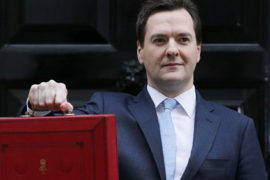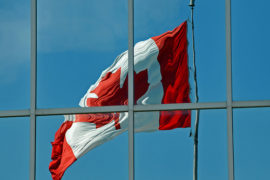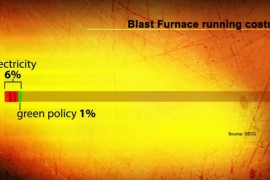MARDELL BIAS?: Mark Mardell is the former ‘Europe’ editor of the BBC and thus has a special knowledge of EU affairs. News-watch research has established, however, that in the past – like so many at the BBC – he has been unduly scathing of Ukip and the case for withdrawal, emphasising in one report claims that supporters of exit were the ‘BNP in blazers’, despite their electoral success. After a stint working in the United States, he has now returned as regular presenter of R4’s The World This Weekend. His programme has been covering the EU referendum particularly closely – most editions since January 24 have carried features about it, some of them taking up the bulk of the running time. On that basis, News-watch is carrying out a detailed assessment for impartiality, covering editions from January 24.
Meanwhile, an analysis so far has shown that at least one edition (7/2) has already been definitely biased towards the EU, on the following grounds expressed in a letter of complaint to the BBC:
‘This was a seriously unbalanced item that explored whether David Cameron’s reform package would be accepted by Portugal. It was followed by questions to two leading figures on the two sides of the EU referendum debate. The sequence inexplicably gave more than double the time to the pro-EU case. Overall, Mark Mardell’s editing presented a one-sided view of the Portuguese attitudes to EU reform. Further, the pro-EU commentator, Sir Mike Rake, the former president of the CBI – whose background as a pro-EU campaigner was not properly identified to listeners – had the time and framework to advance a reasoned case that it was vital that the UK should stay in a reformed EU and that the reform package was in Britain’s interests. Richard Tice, of Leave.EU was afforded much less time (three minutes compared with eight minutes) to outline why he disagreed, and he was pushed by Mr Mardell’s questions into a narrower and more negative framework.’
The most recent edition this Sunday (10/4) was also seriously out of kilter. Mardell reported from Lake Como in Italy from a meeting about the world economy – with mentions of the possible impact of Brexit – arranged by think-tank The European House – Ambrosetti. This provides what it calls ‘high level’ papers about economic issues. This example about a ‘multispeed Europe’ makes it plain that it believes that national differences are a problem because they hinder steps towards ‘full integration’. Rather predictably, therefore, TWTW featured initially a stream of pro-EU guests. First off the blocks was Jason Furman, chairman of President Obama’s council of economic advisers, who said that the European Union had been a success and that exit would be an unnecessary risk. Yo Yongding, said to be an economic advisor to the Chinese government, declared that he was confident that the British people would not be so ‘stupid’ as to want to leave the EU because the benefits of being a member were so obvious. Jens Spahn, the German State Secretary for finance, warned that if the UK did leave, ‘punishment’ would not be the right word, but the UK would not be able to ‘pick just the good things’.
Pride of place was given to ‘one of the main speakers’ from the Ambrosetti event, Elizabeth Corley, former chief executive and currently vice-president of Allianz Global Investors, a fund said to be worth £355 billion. Ms Corley did not mince her words. She warned there was no possibility of an amicable divorce; that exit would force the EU from its main task of ‘creating jobs, creating growth, creating opportunities for its citizens’. She fleshed out in detail her reasons in a four-minute exchange with Mardell in which she delivered 700 words in response to just four questions, and also warned that exit would have short and long-term negative impacts on every aspect of the UK economy.
Thus the first part of the programme sequence focused entirely on the anti-Brexit arguments. Next up was John Mills, described as ‘deputy chair of Vote Leave and founder of home shopping business JML’. Mardell’s tone and approach changed abruptly. With the Abrosetti guests, he had asked straightforward, non-adversarial questions; now he was much tougher. He asked Mills first what his response was to the argument that big business would have to think ‘many times’ before investing in the UK if there was an exit; why he thought people were making up scare stories; that huge companies disputed his arguments that the UK would not create problems for itself; that Elizabeth Corley had noted from her extensive contacts that politicians and business people in ‘Europe’ would not facilitate a friendly divorce; that the German finance minister had warned that the UK could not pick the best benefits of EU membership and discard the rest; that the French government was worried about the rise of the Front National, and did not want to send the signal that leaving the EU was easy (so there would be resistance); and that the Obama adviser and the Chinese economist had warned that a British exit would be bad for the world economy.
Mills had the opportunity to answer each of the points and did so. He rebutted as ‘scare stories’ the idea of negative economic consequences, pointed to the EU’s essential lack of democracy as the reason it was resisting changes, that the perspective being by offered was that of big companies which benefitted disproportionately from EU membership; and that negotiating a trade agreement would be negotiated. His contribution amounted to 885 words in a five-minute sequence totalling 1176 words and eight questions.
The point here is not that Mills was prevented from answering some of the key anti-Brexit points – he was not, and indeed, he gave eloquent responses to several of them. Of concern are several other issues. First was the set up itself. The Ambrosetti event was clearly a framework for a variety of leading political economic and political figures to express pro-EU points in a strongly pro-EU setting and to warn of the dangers of a ‘leap in the dark’ exit. Mardell structured their edited contributions in such a way to give the impression of the wide array of opinion against Brexit – from China, from the US, from within the EU itself and from a huge global investment funds that had potential influence over British economic performance. He also assembled a very formidable cast and, through them, a strong array of their pro-EU arguments. They were introduced as, and came across as, commentators of authority. By contrast, the pro-exit camp was articulated by only one man who was introduced only as a founder of a mail order company. The interview was live (or projected as if live) and Mardell was much more adversarial in tone. Craig Byers, of the Is the BBC Biased? website observed:
‘If you listen to it you’ll hear Mark Mardell adopting a doubting tone of voice and firing complicated question after complicated question at Mr Mills (and interrupting him), and using point after point from his authoritative high flyers. Now, the answers from Mr Mills haven’t stuck in my head the way Mark Mardell’s questions and the earlier (anti-Brexit) contributions have stuck in my head. (Is that just me? Or would it have been most Radio 4 listeners’ experience?) ‘
The key point here is that editors of radio programmes have tremendous power in orchestrating how contributions sound. It’s not enough to put counter-opinion on; it will be swamped if the setting is unequal. Here, unquestionably, it was. A presenter/journalist of Mark Mardell’s experience should do better.
This is the transcript:
Transcript of BBC Radio 4, The World this Weekend, 10 April 2016, EU Referendum, 1.11pm
MARK MARDELL: The possibility that the UK could leave the European Union was the subject of some debate at a conference on the global economy at Lake Como organised by the private Italian’s think tank Ambrosetti House. Speakers set out a range of potential threats to stability – from a Chinese hard landing to terrorist attacks; from migration to Japanese public debt – but every list included Brexit, and not in a good way Jason Furman is chairman of President Obama’s Council of economic advisers.
JASON FURNMAN: The European Union has been very successful in creating an area in which the free flow of goods and labour has contributed to the growing prosperity in Europe and Leave is extremely uncertain terms of what it actually means, and the amount of time and energy and uncertainty that would go into that rather than focused on what we can do to improve the European Union to work together to improve all of our economies would be an unnecessary risk to take.
MM: That’s the view from the White House and the world’s largest economy. What about the second largest? Yu Yongding is a senior economist who has numerous posts advising the Chinese government.
YU YONGDING: No-one really gave very serious consideration about this, because of don’t believe it (sic). They think this political struggle or whatever, I don’t think really British people will so stupid (sic) to vote for leaving EU.
MM: But as an economist, if it did happen what, would there be any economic impact?
YY: I think it’s not favourable towards UK, because you have benefited greatly from this kind of union. For example, free travelling, er lowering investment costs and so on and so forth, so I think you have benefited greatly. On the whole you should stay.
MM: What if we did leave? Here’s the view of Europe’s biggest economy from the German State Secretary for Finance, Jens Spahn.
JENS SPAHN: Is the difference if you’re a member of the family or if you are just a neighbour. Erm, and so there will be a deal of course and somehow we will arrange it but I’m not too sure everyone in Europe would really want to give them a big share again then.
MM: You think that almost Britain would be punished?
JS: Punishment wouldn’t be the right word. But as I said, if you decide to leave, you just can’t pick the best things to remain for yourself and get rid of the rest. It’s a package you get, when you are a member of the European Union, and by leaving you just can’t keep the good things.
MM: One of the main speakers at the conference was Elizabeth Corley, until last month CEO of Allianz Global investors, now vice president of that company which operates in 18 countries and manage funds of £355 billion. I asked her what she thought leaving the EU might mean.
ELIZABETH CORLEY: I spend a lot of time in Europe talking with policymakers, regulators some government officials and, and companies. There is no mood for an amicable divorce, if this marriage is severed, for lots of reasons: one it just isn’t possible to do this amicably, you’re negotiating a trade agreement; secondly it will divert Europe from what its primary focus is at the moment, which is creating jobs, creating growth, creating opportunities for its citizens. It will divert an enormous amount of energy into a negotiation which isn’t going to add any value. And thirdly I think there would be a risk that if it looked too easy then there might the other referenda in other parts of Europe, so there’s no incentive at all for anybody in Europe to make this easy.
MM: Is that your political view, which of course you’re absolutely entitled to have, or is it your sort of analysis, as . . .
EC: It’s a view based on, if you like, exposure to people in Europe, and running a global business and thinking about these things, thinking about opportunities that come from cross border business. So I’m always thinking about, is it easy or difficult to do business cross-border. And one of the things that makes it much, much, much easier is if you’ve got a trade agreement. It’s cheaper and it’s easier and I suppose the other thing is, thinking about the economic consequences – there’s a lot of economic research out there, we’re in the financial markets and there’s no doubt at all in the minds of my economics team and most of the economics out there, that this is damaging economically. Now, economics is only one reason for the vote, but it’s such a big negative that it can’t be ignored. My concern is that if we talk about GDP growth and economics and the world, it means nothing at all to somebody who says, ‘but I worry about can I get my child into school?’ You know, I’m a grandmother, my little granddaughter is about to try and find a school place, I care about her, I care about my daughter and my husband’s jobs, my brother and sister are self-employed small business people, critically depend on the level of demand. So for me it’s the opposite of political, it’s personal, its corporate and it’s economic.
MM: What do you think it would mean for the way you and your company do business?
EC: We have, at the moment, freedom to hire talent wherever we find it in the world, and particularly wherever we find it in Europe. So, for example, if we find somebody Brilliant in the United Kingdom that we want to hire and create jobs and invest in the UK, we would have to think, not just once but many, many times as to whether we’d continue to do that. So in the medium term and long term it would definitely have an impact on where we invest, where we hire people, the number of jobs we create, the research and development we do, how we create new products. I’m afraid it would have a big impact long-term. And I think that’s also reflected in the, in the survey that the CBI did, and also the work that PwC did for them, which is talking about, if you like, the most favourable option, which is a quick, friendly divorce, and we get a European free trade agreement. And even under that, the work that PwC economists have done for the CBI says by 2020 our global domestic product will be down 3%.
MM: If that is the case, and people know it’s a possibility, wouldn’t investment already be being affected?
EC: It is. It is be affected. And you also . . . this is a general problem that came out for the world by the way, there is already a reluctance on behalf of corporates to invest medium and long-term, because they’re worried about . . .
MM: In Britain.
EC: Globally. Already a concern about investing globally because of the weak demand and the consumers aren’t buying as much as they used to, governments aren’t spending as much as they used to, companies are not spending as much as they used to. Therefore every single country is fighting hard and competing to get whatever investment there is in their countries. We would be at a significant competitive disadvantage if we’re no longer the gateway into Europe for English speaking countries. And therefore we would be competing with one hand behind our back for that foreign direct investment.
MM: Elizabeth Corley of Allianz GI. So we’ve heard a range of concerns about what leaving the EU would mean, so with me now John Mills, founder of home shopping business JML and deputy chair of Vote Leave, good afternoon.
JOHN MILLS: And to you.
MM: And what do you make of that, the argument that they, this big company, would have to think not once but many times about investing in the UK if we left?
JM: Well, this sounds very much to me like what we had 10 or 15 years ago over the euro, when we were told by all these sorts of people that investment would dry up, that the economy would do worse and worse, that The City would collapse, and it just didn’t happen. And I think a great deal of what has just been said is sort of scare stories which won’t be the outcome if there is a Brexit.
MM: Why do you think they’re scare stories, and why do you think people are making those arguments?
JM: Well, I think that large companies do have some benefits to secure from the European Union, because it’s easy for them to lobby Brussels and to get special advantages for themselves, it’s the smaller companies that are more fleet of foot, who are keener on Brexit, and business is very divided on it, erm, and it simply isn’t the case that there is a massive majority amongst all businesses for staying in. That’s very far from being the case.
MM: Well, obviously, small business is important, but you have this huge company arguing it would mean a significant competitive disadvantage for Britain.
JM: But I mean, I’m really not terribly clear where this competitive disadvantage is going to come from, because it seems to me to be extremely likely that there’s going to be some kind of free trade deal between Britain and the rest of the EU if we do come out. In which case most of the conditions which Allianz and other people operate in will stay the same. I just don’t believe there’s going to be a massive disruption, a massive change in the way everybody behaves as a result of Brexit, because I think that actually from a commercial point of view there won’t be much change in the conditions that everybody has to operate in.
MM: Of course, Elizabeth Corley was making that point as well, she says she talks lots of business people and lots of politicians in Europe and she’s certain there would not be a friendly divorce.
JM: Well, I don’t see how she can be certain, I mean, it seems to me there are a whole range of things where we just really don’t know what the situation’s going to be, one way or the other. And for the people who are keen on remaining, always to assume the worst, to talk Britain down, to assume that the conditions are going to be more and more difficult, it’s just not a really . . . a realistic scenario, I think that it’s much more likely that very little will change in the commercial a sphere as a result of our coming out of the European Union, it may be easier for us to get trade agreements with other countries abroad, and I think it may well be that the economy would be a bit bigger if we do come out. But I mean, I think the scare stories that we’ve heard of 9% reductions in GDP, and 3 million jobs being dependent on us being involved with Europe are just really scare stories.
MM: But you’re talking about, the sort of deal that we’d have, you say it would be a good deal, but then we also heard the German finance minister saying it’s different being a family member to being just a neighbour, we wouldn’t want to give us (sic) a big share, you can’t pick the best, it’s a package, you can’t keep just the good things.
JM: Well, I think that, that may well be the case, but if you look at the two major components of what renegotiation would be about: one is about trade, where I think it’s very likely that there will be at a trade agreement, I mean, if you look at the moment and the situation from Iceland to Turkey, from Poland to Portugal there’s free trade in industrial goods everywhere, it seems to me inconceivable that you’re going to have then just the UK as one part of the European landmass which doesn’t have free trade, I mean it just doesn’t make any sense, so I’m sure there will be some sort of free trade agreement. Indeed, I think just about everybody who’s looked at this carefully agrees this will happen. (words unclear due to speaking over)
MM: (speaking over) But there’s a political dimension as well, isn’t there? Because in France they’re worried, the government is worried about the rise of the, er, the National Front who are also wanting a referendum, there are worries about other countries that might want to leave – they would want to give the signal ‘it’s not easy to break up’
JM: Well they may want to give that signal, I agree, but it’s not terribly easy to see how this would actually translate into threats to the UK. And I think there is a big democratic problem in Europe which is that, by and large, the direction in which Europe is travelling, towards more and more federalism and integration, is not one which is supported by the population in most countries, which is why the Commission is so reluctant to have referendums about any of these things. I think there’s a gap opening up between what people want and the direction in which the EU is going, which is very dangerous and I think the rise of these various parties in different parts of the European Union, which want to come out, or don’t want to be in the euro is very significant. We’re just not seeing Europe carrying its people with it, with the changes and direction that it wants to go.
MM: We heard from the White House view, which we do know, we heard from a Chinese economist, why do you think these big global figures are saying it would be bad for the world economy – they don’t care about what it means for Britain, but for the world economy.
JM: Well, I’m not sure it would be bad for the world economy . . .
MM: (interrupting) No, but they’re saying it would.
JM: Well, I agree, these people are saying all sorts of things, the question is whether what they’re saying is actually true, and likely to be the result of Brexit. I mean, it depends very much, of course, on the terms on which it takes place, and how it’s all conducted, but if there’s reasonable amount of goodwill all round, which is in everybody’s interest, I think that we could very easily see Britain refashioning our relationship with the EU much more on intergovernmental terms and as a part of a political project with free trade still being in place, in which case I think the vast majority of people in Britain will have got much closer to what they really want and I don’t think that would damage everybody else.
MM: John Mills thank you very much indeed.











